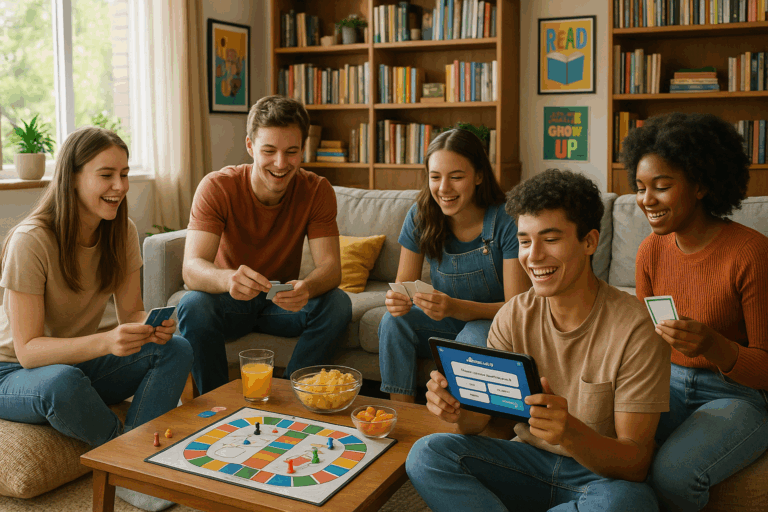🌍 Yes, you heard it right! Our cognitive skills are the keys to this vast treasure chest of limitless potential. But how can you unlock it? That’s what we are going to delve into in this in-depth exploration of cognitive skills development.
The term ‘cognitive skills’ might sound technical, but don’t let that intimidate you. Simply put, cognitive skills are the core skills your brain uses to think, read, learn, remember, reason, and pay attention. Working together, they take incoming information and move it into the bank of knowledge you use every day at school, at work, and in life. 💼
However, just like any muscle in our bodies, these skills need regular training to stay sharp and effective. That’s where cognitive skills development comes into play. This process involves using various techniques and activities to improve our ability to receive, process, store, and use information.
Why is Cognitive Skills Development Crucial? 🎯
Imagine having the ability to process information faster, remember things easily, think clearly, and make decisions quicker. Sounds appealing, right? Well, that’s what cognitive skills development can do for you. By honing your cognitive skills, you can unlock your full potential, making you more efficient and productive in both your professional and personal life.
In this comprehensive guide, we’ll go through why cognitive skills development is important, how it can benefit you, and practical ways to improve these skills. Whether you’re a student looking to enhance your learning capabilities, a professional aiming to boost productivity, or someone simply interested in personal growth, this article is for you.
What’s in Store? 📚
Our journey will begin with understanding the different types of cognitive skills, from attention and memory to logical reasoning and visual processing. We’ll unravel the science behind these skills and how they impact our daily lives.
Then we’ll move onto the importance of developing these cognitive skills. We’ll discuss how improving these skills can enhance various aspects of your life, from academic and career success to personal growth and well-being.
Next, we’ll tackle the exciting part – how to develop these skills. Here, we’ll delve into practical strategies and techniques you can use to improve your cognitive abilities. These will range from brain-boosting activities and exercises to lifestyle changes and technologies.
Last but not least, we’ll discuss the role of technology in cognitive skills development. We’ll explore how digital tools and technologies, like brain training apps and virtual reality, are revolutionizing the way we improve our cognitive skills.
So, are you ready to unlock your full potential? Let’s embark on this fascinating journey of cognitive skills development. 💪
Remember…
As you read, keep in mind that cognitive skills development is not a one-size-fits-all concept. Each of us has unique cognitive strengths and weaknesses, and what works for one person may not work for another. The key is to understand your cognitive profile and tailor your development strategies accordingly. And always remember – with patience, persistence, and the right approach, you can unlock the limitless potential of your mind.
🚀 Unleashing the Power: An Introduction to Cognitive Skills Development
Have you ever wondered how you can unlock your full potential and supercharge your cognitive skills? It’s not as daunting as it may seem. As we delve into this complex, yet fascinating topic, we will unravel the power of cognitive skills development. I encourage you to strap in and embark on this enlightening journey with me.
But first, let’s clarify what cognitive skills are. Cognitive skills are the core skills your brain uses to think, read, learn, remember, reason, and pay attention. They are integral to how effectively we process information from our surroundings, how well we learn and apply new knowledge, and how we reason and solve problems.
Developing these skills is like unlocking hidden potential, a power that lies within each one of us. It’s like finding a key to a treasure chest full of abilities that can dramatically enhance the way we think, learn, and perform in every aspect of our life. But, how do we achieve this? Let’s delve deeper.
🧩 The Fundamental Cognitive Skills: A Closer Look
Every cognitive skill plays a unique role in our cognitive development, and they often work together in unison. They are classified into seven categories: attention, working memory, long-term memory, logic & reasoning, visual processing, auditory processing, and processing speed. Each skill is like a piece of a puzzle that makes up our cognitive functioning, and developing them can lead to significant improvements in various areas of our lives.
Attention
Attention is the cognitive skill that allows us to concentrate on a particular piece of information while ignoring distractions. It’s the first step in processing any information. Without it, learning or comprehending anything would be a tough task.
Working Memory
Working memory, on the other hand, is the ability to hold and manipulate information in our mind over short periods. It’s like mental juggling, where you keep multiple pieces of information in the air simultaneously. It’s crucial for tasks like problem-solving and decision making.
Long-term Memory
Long-term memory is the ability to store and recall information over long periods. It’s like a vast library of facts, experiences, skills, and images that we have accumulated over our lives.
Logic & Reasoning
Logic and reasoning are the abilities to reason, form ideas, and solve problems. They are the cognitive skills that we use when we solve puzzles, answer riddles, or engage in complex tasks that require us to think critically.
Visual & Auditory Processing
Visual and auditory processing are the abilities to understand and process visual and auditory information. They allow us to interpret and understand what we see and hear.
Processing Speed
Processing speed is the rate at which we process information. It’s like the speed of your mental processor. The faster your processing speed, the quicker you can understand and respond to information.
💡 The Importance of Cognitive Skills Development
Now that we have a deeper understanding of cognitive skills, we can delve into the immense value of developing them. Cognitive skills development is like sharpening a knife; it allows you to cut through challenges more efficiently and effectively. It impacts every facet of our lives, from academic performance to professional success, and even interpersonal relationships.
For example, improving attention skills can dramatically increase productivity by reducing the impact of distractions. Boosting working memory can enhance problem-solving abilities, helping you juggle more information and come up with better solutions. Enhancing long-term memory can improve academic performance by making it easier to recall information during tests.
Furthermore, developing logic and reasoning skills can enhance decision-making abilities, leading to better outcomes in professional and personal situations. Improving visual and auditory processing skills can increase comprehension, aiding in tasks like learning a new language or mastering a musical instrument. And lastly, enhancing processing speed can improve overall cognitive efficiency, allowing you to think, learn, and react faster.
🛠 Techniques to Develop Cognitive Skills
Unlocking your full potential through cognitive skills development may seem like a daunting task, but it doesn’t have to be. There are several proven techniques that can help you enhance these critical skills. Some of them include brain training games, mindfulness meditation, physical exercise, adequate sleep, healthy nutrition, and lifelong learning.
Brain Training Games
Brain training games are designed to exercise various cognitive skills. They are like a gym for your brain. There are many brain training apps available that offer games targeting different cognitive skills. One example is Lumosity, which offers a comprehensive suite of games designed by neuroscientists to train memory, attention, and more. Check out this video from Lumosity’s official YouTube channel to see how their games work: “Train Your Brain with Lumosity” (Lumosity).
Mindfulness Meditation
Mindfulness meditation is a practice that involves focusing your mind on your experiences in the present moment. It’s like a workout for your attention skills and has been shown to improve working memory and reduce stress. Check out this guided meditation video for beginners: “Mindfulness Meditation for Beginners” (Goodful).
Physical Exercise
Physical exercise is not just good for the body, but also for the brain. It has been found to improve a range of cognitive skills, including memory, attention, and processing speed. Check out this video on how exercise impacts the brain: “The Brain-Changing Benefits of Exercise” (TED-Ed).
Adequate Sleep
Adequate sleep is essential for cognitive function. It is during sleep that the brain consolidates memories and removes toxic waste products. A lack of sleep can impair various cognitive skills, including memory, attention, and decision-making. Check out this video to learn more about the importance of sleep: “The Benefits of a Good Night’s Sleep” (TED-Ed).
Healthy Nutrition
Healthy nutrition is another key to cognitive skills development. Certain nutrients, like omega-3 fatty acids and antioxidants, have been shown to support brain health and cognitive function. Check out this video to learn more about the best brain foods: “10 Foods to Improve Your Brain Health” (Healthline).
Lifelong Learning
Lifelong learning is the practice of continually learning and updating your skills throughout your life. It’s like adding new books to your mental library. Lifelong learning not only enhances cognitive skills but also keeps them sharp as we age. Check out this video to learn more about the benefits of lifelong learning: “The Benefits of Lifelong Learning” (Lifelong Learning UK).
📚 Tools and Resources for Cognitive Skills Development
Thankfully, in this digital age, there are numerous tools and resources available to aid cognitive skills development. These include brain training apps, online courses, educational videos, podcasts, and books. Let’s delve into some of the best resources available.
Brain Training Apps
As mentioned earlier, brain training apps are a great tool for cognitive skills development. Some popular ones include Lumosity, Elevate, and Peak. These apps offer a variety of games and exercises designed to train different cognitive skills.
Online Courses
Online courses are a treasure trove of learning opportunities. Websites like Coursera, edX, and Khan Academy offer courses on a variety of topics, allowing you to learn at your own pace and challenge your cognitive skills.
Educational Videos
Educational videos are a fun and engaging way to learn and develop cognitive skills. YouTube channels like TED-Ed, Vsauce, and Crash Course offer videos on a wide range of topics that can stimulate your curiosity and critical thinking skills.
Podcasts
Podcasts can be a great way to learn on the go. They can help you learn new things, stimulate your curiosity, and develop your listening and comprehension skills. Some popular educational podcasts include “Radiolab”, “Stuff You Should Know”, and “The Infinite Monkey Cage”.
Books
Books are a timeless resource for learning and cognitive skills development. They can help you deepen your knowledge, stimulate your imagination, and improve your reading comprehension skills. Websites like Goodreads can help you find books on any topic you’re interested in.
The journey to unlocking your full potential through cognitive skills development is a marathon, not a sprint. It requires consistent practice and a growth mindset. But with the right strategies and resources, it’s a journey well worth taking. So, are you ready to unlock your full potential? The power is in your hands!

Conclusion
In conclusion, we have traveled through a broad spectrum of fascinating and intricate aspects related to software engineering and Information Technology (IT). The journey started with a thorough explanation of software engineering processes, their complexity, and their critical significance in modern times. Furthermore, we’ve explored IT’s role in today’s fast-paced, digitalized world, with a particular emphasis on its impact on businesses.
A significant portion of this discussion centered around the evolution of software development methodologies, from traditional models like the Waterfall Model to agile frameworks such as Scrum and Kanban. We’ve talked about the pros and cons of each, as well as the factors influencing the choice of approach for a particular project. It’s important to understand that selecting the appropriate software development methodology is crucial for project success.
We delved into the world of coding languages, discussing popular ones like Java, Python, and C++. We’ve also highlighted the importance of staying updated with the latest technology trends, be it advancements in artificial intelligence (AI), machine learning (ML), data science, cloud computing, or cybersecurity.
Moreover, the role of quality assurance (QA) in software development was emphasized, underlining its significance in delivering error-free, high-quality software products. Also, we explored IT’s role in transforming businesses, improving efficiency, and enabling digital transformations.
I hope this article has enhanced your understanding of these complex concepts, shedding light on their practical implications. The world of software engineering and IT is vast and ever-evolving. Continuous learning and upskilling are key in this field, enabling you to stay competitive and contribute to technological advancements.
If you found this article helpful, I encourage you to share it with others who might benefit from it. Also, feel free to leave a comment below, sharing your thoughts or experiences related to software engineering and IT. Your insights could provide valuable information for others in this field.
I encourage you to delve deeper into these topics, broadening your knowledge and understanding. You can explore more about software engineering methodologies at the [IEEE Software Engineering Bookstore](https://www.computer.org/technical-committees/software-engineering/), or stay updated with the latest in IT at the [TechRepublic](https://www.techrepublic.com/). Remember, knowledge is power, and sharing that knowledge benefits us all. Let’s keep the conversation going. 👨💻🚀🌍
Remember: “Stay hungry, stay foolish” – Steve Jobs. Because the more we learn, the more we realize how little we know. Happy learning! 🎓📚
References:
[1] IEEE Computer Society – Software Engineering
[2] TechRepublic – IT News, Tips, and Advice
Thank you for reading, and until next time! 👋
By Rodrigo Almeida



